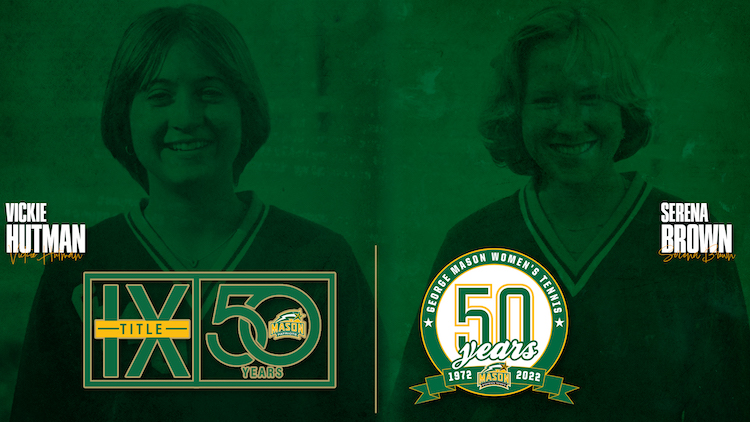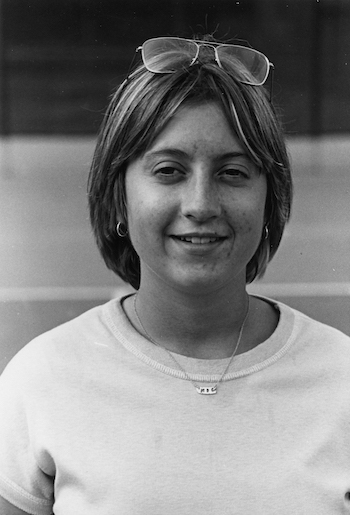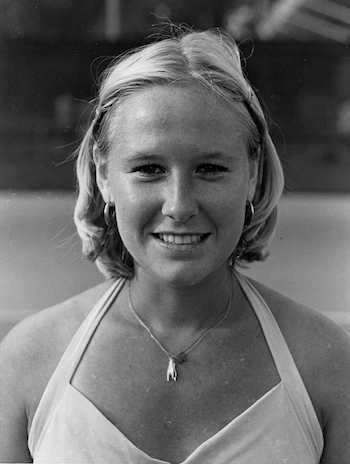The passage of Title IX in 1972 also marked the beginning of athletic opportunities for women at George Mason University. Mason's first women's sport—tennis—started its inaugural season in 1972-73. At the time, the university had six men's teams: basketball, cross country, baseball, soccer, golf, and men's tennis. Wrestling was added in 1972 along with women's tennis.

Throughout 2022, Mason Athletics has celebrated the 50th Anniversary of Title IX at Patriots sporting events, with vignettes and stories from alums on how Title IX impacted them. On Saturday, Nov. 5, we celebrate 50 years of women's tennis with an alumnae match at the Mason Tennis Complex, beginning at 11 a.m.

To mark the anniversary, GoMason.com caught up with the first two women student-athletes at Mason to obtain an athletics scholarship, Serena Brown '82 and Vicki Hutman '78.
Their circumstances and the routes taken to the Mason tennis courts had similarities beginning with having to play on the boy's tennis team in high school. At the time, it wasn't uncommon to have only boy's teams in high school as girls' opportunities were minimal.
According to data from the National Federation of State High School Associations, only 7% (294,000) of those of participating high school sports in 1972 were female. There have been great strides made because of Title IX as more than 3.2 million girls played high school sports in 2019.
Hutman became the first woman to earn an athletic scholarship at Mason. She arrived on the Fairfax Campus in 1974 from nearby Loudoun County High School, where she played the No. 2 singles position on the boy's tennis team.
"The boys on my team were respectful toward me, but there were times that my opponent either complained about playing a girl or even refused to play me and defaulted the match," Hutman said.
Brown arrived at Mason the following season after spending a year taking classes at Northern Virginia Community College. A product of James Madison High School, the Vienna native also played on the boy's high school tennis team, but her road to play on the team was a little more challenging.

The athletic director, who was also the boys' tennis coach, denied Brown's request to play on the boys' team. Her parents and another family whose daughter wanted to play high school golf at a different local school filed a lawsuit through the American Civil Liberties Union (ACLU) against the Commonwealth of Virginia for sex discrimination.
"We won, and because we both had junior regional rankings and were good enough, we were allowed to play on the boys' teams the next season," Brown said. "I was put in the No. 6 position, even though I could have played higher on my team."
In 1972, for the first time, the boy's tennis team from James Madison High School won the Great Falls District title, and Brown was a big part of that success playing and winning all of her matches at No. 6 singles.
Brown learned about the athletic scholarship at Mason from Lois Tuey, a friend competing on the Patriots team at the time. She mentioned that athletic scholarships are available for the women's tennis program and that she should "go and get one."
Brown was excited about the opportunity. "I grew up in the area and was thrilled to learn that GMU at two women's tennis scholarships," she said. "Had the tennis scholarship not been available, I would not have pursued a four-year degree at the time."
At Mason, Brown and Hutman were the top players in the mid-to-late 1970s. They played the top two singles positions and were often paired at doubles earning a winning record. The duo earned back-to-back Most Valuable Player awards for Mason women's tennis, Brown for the 1976-77 season and Vicki Hutman the following season.
According to Mason's limited records, the teams were very competitive during Brown and Hutman's time with Mason. The Patriots team had winning seasons each year on the team under part-time coaches.
"It was a great experience playing tennis at George Mason," said Hutman. "I enjoyed playing competitive matches and meeting other players and coaches, and the networking was great."
The college experience was a springboard for Hutman's career. She turned professional playing in the Women's Tennis Association (WTA) lower-tier professional tournaments in Canada and the United States for more than 10 years while teaching tennis. She obtained her Professional Tennis Registry Certification to become a teaching professional.
Hutman had a 30-year career in tennis, working at several clubs and country clubs in Virginia, including 10 years as the director of tennis at the nearby Country Club of Fairfax.
Brown graduated with a bachelor's degree in art in 1982. Hutman, who majored in education, graduated in 1978.
Hutman would go on to earn a master's degree in psychology counseling from Marymount University and open a private practice from 2008 to 2015 doing sports psychology coaching for high-level athletes in the Washington, D.C., metropolitan area.
Playing college tennis as a scholarship athlete was a saving grace for Brown, who was experiencing family issues that left her in a difficult situation.
"Tennis was the most positive thing in my life, and it helped me get through a challenging period," said Brown. "The scholarship was paramount because I would not have been able to attend college without it."
Brown married her college sweetheart after graduation, and they had three children. After returning to Virginia after a few years in Texas, Brown was hired by State Farm Insurance, becoming one of only two women agents in the office.
Brown credits her collegiate tennis experience as a catalyst to employment. "They loved that I competed on the tennis team at Mason, and I know it helped me gain the coveted position in a competitive male-dominated business."
Although small in stature—Brown was listed at 5'4" and Hutman 5'2" on the roster, the women loomed large in their efforts to advocate for women in sports at Mason. Both served on Mason's Title IX Student Committee in 1975.
When asked their thoughts on the impact of Title IX on women's sports over the past 50 years, they said that while there has been significant changes in women's equality, the fight is far from over.
"Colleges and universities need to continue to advance women's sports to even the playing field," said Brown. " The benefits are immeasurable. All life's lessons learned on the court or field can be transferred to your business or career."
"Without Title IX and the pioneers who pushed to pass that legislation, we would not be as far ahead as we are now," said Hutman. "However, as we see today, women are still fighting to have equal pay, similar equipment, training facilities, and a lack of women coaches, so we still have a long way to go."
Hutman emphasized, "It should not take this long to be an equal human being in every way."
More Mason alum stories on the impact of Title IX can be found at Mason Athletics 50th Anniversary of Title IX Celebration.
Related News
- February 3, 2026
- December 1, 2025
- October 27, 2025
- September 26, 2025
- August 14, 2025
